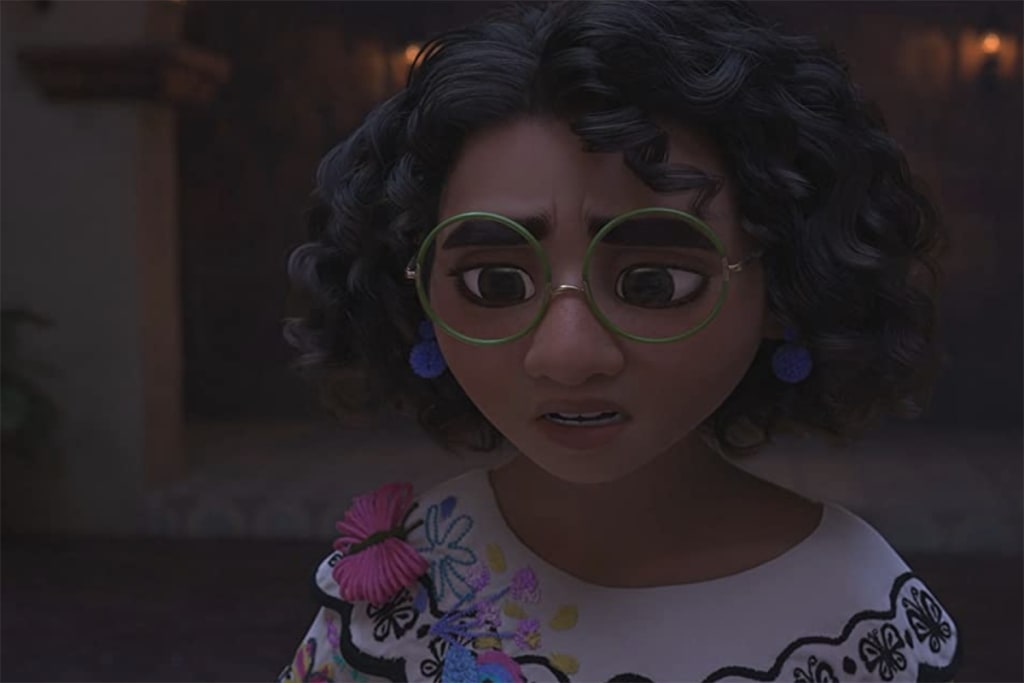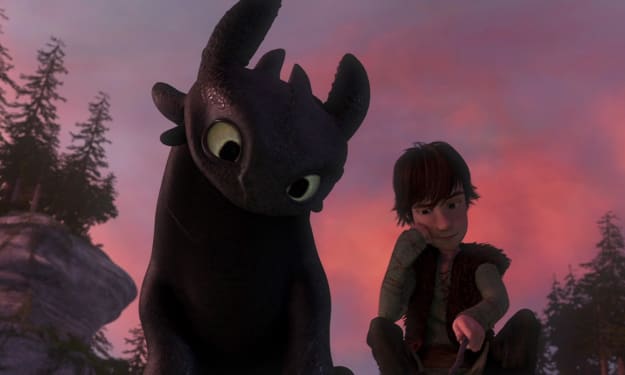How Encanto Fails Mirabel
Encanto both is and isn't for the scapegoats

Encanto is not a bad movie.
Gorgeously animated with a roster of catchy songs and fascinating family members, it's one of the most interesting and meaningful Disney movies to come out in a long time. I am also not going to sit here on a high horse and say that anyone in the movie is a villain (they're not), or that liking it is bad (it isn't), or that you can't have zero qualms with it (that's perfectly fine).
But one thing I've noticed is how in many ways, Mirabel is one of the least talked about characters despite her placement as the protagonist, a lack of popularity that eerily reflects how she feels in her family unit in the film itself. Siblings with oldest sister syndrome have flocked to Luisa's "Surface Pressure," people have (rightly or wrongly) read queerness onto Isabela's perfectionism and self discovery, and the rest of the family but especially Bruno, Dolores, and Camilo are all fan favourites. As the crucial point of conflict in the movie, with her rigidness as well as her journey towards reconciliation, Abuela Alma is hotly debated and fiercely defended.
As always: this is just my opinion, influenced by friends of colour who saw their own families and dynamics reflected in the movie but had a less favourable feeling about it. This was written in consultation with them, if you relate to Mirabel and the movie reflects your experiences and families in a positive light too, that's wonderful and I'm happy for you. I have intergenerational trauma in my family, as I would suppose just about everyone does to a degree, and I've also experienced emotional abuse; none of that means my experiences are universal, or even worthwhile to you, and that's okay. This analysis is just based off my opinion, family dynamics and responses I've seen, and an English degree that taught me everything is subjective. Okay? Okay.
But for once, let's stop talking about Bruno, and let's look at
Mirabel
The only Madrigal without powers, it's never entirely explained why Mirabel doesn't have a gift. As such, her plight can somehow come off as a cruel twist of the casita; can't the house choose to give her a gift? Or at least a room of her very own, even if it's not magically inclined? The movie doesn't answer either of these questions, which is fine, even if they came to mind while watching.
My main issue is how the movie handles Mirabel's status as a scapegoat. Most of the time, there is no 'reason' one child is a scapegoat, consistently blamed for the family's problems and forced to shoulder extra blame, although they are consistently juxtaposed against the favoured 'golden child' in their parents' eyes. Or in this case, Abuela's favouritism towards Isabela (which is its own weight, but we'll touch more on that later). For the movie to give Abuela an excuse to scapegoat Mirabel, that Mirabel represents what she's afraid of, is already a little iffy. However, there are undoubtedly families that use their children's neurodivergency, or queerness, or anything else as a 'reason' for scapegoating, so you can take it as you will.
However, the fact that Mirabel is a scapegoat is undeniable. While Alma's treatment of Mirabel is nasty and overt, she at least apologizes by the end of the movie (although again, we'll talk more about that later). The fact that Mirabel is the baby of her family, save Antonio, makes it even worse, as she's only fifteen and has been treated this way for around ten of her most formative years. Her parents are loving, but largely work to pacify rather than resolve the situation, leaving words of comfort and not much else.
What was more bothersome to me is that Isabela, her eldest sister who is a young adult, is repeatedly cruel to her teenage sister, and is never called out for it at any point in the movie. No one says Isabela's treatment of Mirabel is unfair, and while "What Else Can I Do" is about the sisters reconciling, it's largely Mirabel empathizing with her sister's perspective and realizing that Isabela has been suffering too. But Isabela is never forced, or asked to, recognize what her sister's been through.
This is the consistent problem with Mirabel's storyline throughout the movie, in both the smaller moments and the larger ones.
While the rest of her family, particularly Luisa, have it emphasized to them by Mirabel that they are more than their gift, their attempts (largely her mother's) to do the same rarely work. By the end of the movie, her family has that they are more than what they can do or provide to the family.
However, Mirabel is never given the same treatment or the same conclusion. Her 'gift' is that she has a unique perspective on the cracks literally (and figuratively) forming in her family and in her home, and that this gift was necessary for their success. Mirabel is praised and seen as worthwhile in spite of her 'lack' of a traditional gift because she does emotional labour for the rest of her family, particularly her sisters and grandmother. The end conclusion, in spite of what the movie's lyrics occasionally imply, is that Mirabel's willingness to constantly sacrifice her own needs to take care of her family is what makes her special and in turn, worthy of having them take care of her in ways that they weren't before (such as providing her a doorknob, and Abuela and Isabela lightening up on their criticism of her).
This is reflected even in the 'happy' end of the movie, when Mirabel's doorknob and her touch restores the magic to the casita, and her family's powers, while Mirabel is still left without a gift. In her closing moments, she fixes everyone else's problems, and then hers are fully resolved.
Nor is Mirabel ever fully able to prioritize herself. She spends the movie trying to fix her family's issues, believing if she can be of use, she might win Abuela's approval. Even when this appears to be a futile dream and Mirabel delcares, "I will never be good enough for you," in the climatic argument scene between her and Abuela, the focus is not truly on Mirabel. It is on the crumbling house while way Mirabel points out Alma's unfair treament and the boatloads of pressure Alma has put on the rest of the family — not how Abuela has made Mirabel feel awful for years, living in the expectation of being a frightful omen of losing the miracle for a decade and believing she will always be a disappointment. The rest of the family never steps in to take Abuela for task for how she treats Mirabel (one attempt is made by Mirabel's mother, but it's small and not very assertive) and the family also never speaks up for themselves, either, leaving it all on Mirabel's shoulders to do so.
I don't think I have to say that it's not the scapegoat's responsibility to fix how their family has treated them. I don't think I have to say it's not Mirabel's job to fix her family's problems so her sister and grandmother can start treating her better, so the rest of the family can grow a stronger spine.
Yes, it's good and heroic that Mirabel is compassionate and empathetic, but it's unfortunate that her compassion is so often one sided throughout the movie, and that the "Surface Pressure" she's been living under is never fully taken off. She's not allowed to be angry with her family just for how they've treated her, even though that on it's own would be enough. She always has to bring up everyone else, and lift up everyone else, no matter the harm they've inflicted on her. Because Mirabel is never allowed to see her own pain — her own person — as worthy enough of taking a spotlight, precisely due to her family's treatment consistent of her and view of their gifts.
And I think that's just unfortunate.
However, that is to say:
Alma is Not A Villain
This is perhaps a more nuanced take than the internet is necessarily ready for, but here it is: being an abuser — or someone engaging for periods of their life in abusive behaviour — does not make them an inherently bad person. Even the healthiest of relationships have unhealthy aspects in them, because humans are inherently flawed people who bring their own baggage into relationships and circumstances, whether it's core wounds, trauma, mental illness, or all three.
In many ways, the demonization of emotional abusers as monsters led me to ignore the red flags I should have recognized in a couple of key peer relationships. They were my friends and I didn't want to think poorly of them. Identifying their actions towards me as abusive felt so extreme and cruel, and I never want to be cruel. I also, a year plus in leaving that toxic friend group, think that any of them ever meant to be abusive. They were repeating patterns they'd seen or unhealthily prioritizing their own sense of security and self-importance.
While abusers often intend to make people to feel small to mitigate the level of control — of influence or confidence — their victim has, it is rare for actual abuse to be intentional. People never think of manipulation or abuse as abuse when they commit them, they think of it as a way to maintain the status quo and get what they want. Often times this rigid need for control is born out of fear, or fear stemming from love.
It is still abuse.
Thus, Abuela Alma's abuse was also not intentional, but that doesn't absolve of her of the consistent anxiety issues and genuine fear that she gave many of her children and grandchildren. Alma being abusive to Mirabel and to the rest of her family to varying degrees does not make her a villain.
Alma went through a devastating personal loss. I can't begin to imagine the trauma of displacement. But I do know, from both my own family and the family of friends, that while trauma can be an explanation for abuse, it can also be wielded as an excuse.
One of my abusers was increasingly mentally unwell during the time of our friendship, and whenever they didn't use it as an excuse for their behaviour, I certainly did. I didn't want to add to their pain; I felt awkward and unsure about calling them out. When I tried, gently, they rationalized it away due to their suffering, or flat out gaslit me (which Alma also does to Mirabel when she says that the cracks aren't there at Antonio's party, leaving Mirabel feeling crazy and ashamed in front of her family and the entire village. A fifteen year old girl, just hung out to dry).
Herein lies many of my issues with Encanto. I am not opposed to reconciliation storylines with abusive family members, if done well. I think Encanto came very close to honouring Mirabel's journey, particularly in the first two-thirds of the movie. But the movie's honouring of Mirabel crumbles along with the casita, as it comes to privilege Abuela's pain — and her continuous place as the matriarch — over Mirabel's.
Yes, Abuela did an incredibly powerful thing by going back to the site of her trauma and sitting with Mirabel by the river, finally opening up to her granddaughter. But Mirabel is still the one who sat there, unsure of her place in her grandmother's heart, and displaced within her family because of her grandmother's treatment of her, waiting and wondering if she would be welcomed back.
Abuela didn't worry about those things for herself. She knew, no matter what, that her children and grandchildren would welcome her home. Mirabel is then forced to build her up, placating and pacifying, pushing her own feelings to the side to build her grandmother up, listening and empathizing with Alma's pain after a lifetime of doing so, and Abuela barely doing the same for her. Mirabel says, "We are a family because of you," in spite of Alma never making her feel like a real part of the family.
Compassionate, yes. And maybe forgiveness isn't always about deserved. But I would have been far more confident about how Mirabel's pain and place as the scapegoat was honoured if things had been tweaked, here and there. Alma being unsure, and apologizing to each of the family, waiting for them to welcome her back, while Mirabel gets to see her family choose her over her grandmother's approval for the first time in her life.
Speaking of apologies and approval,
Let's Talk About Bruno
It was upon meeting Bruno, properly, that a sinking feeling started to grow in my gut while watching Encanto. A lovable man with rats and burdened by a gift he was blamed for, Bruno is both the mirror and opposite of Mirabel. He was the scapegoat, and left to try and fix things to the best of his ability. The fact he left, in his own words, to protect Mirabel from their own family was all the flaming red flag I needed that something was horrendously wrong even besides the gaslighting and consistently unfair criticism.
Again, the comparisons to Bruno are used to highlight Mirabel's bravery and compassion. Rather than leave, she stays and stands up for the family, and eventually helps to heal them. However, just like his niece, Bruno is also never allowed to prioritize his own pain as the scapegoat. He never gets a chance to be angry with his mother for disowning him, or the way he actively heard his family blacklist his name for a decade. He is angry on Mirabel's behalf — and in many ways is the only family member to do so, as Mirabel's mother Julieta is indignant, but never fierce — but expresses zero anger on his own.
It never even seems to occur to him that he has a right to be angry and this is again, reflected even in the 'happy' ending song of the movie.
He never critiques Abuela (and if memory serves correctly, she never apologizes to him, either). When Bruno comes back to his family, he sings, "Got a lotta 'pologies I got to say" to his sisters and presumably the rest of the family, who assure him it's alright and that he has nothing to apologize for. In this way, his sisters are right. Bruno has nothing to apologize for.
But his sisters, especially Pepa, do. They let their children, especially Camilo (who I love) spread terrible rumours. She and her husband blamed him years before the birth of their children for the hurricane at their wedding. His sisters never campaigned for him against Abuela and Bruno seems surprised they even wanted him back; they didn't even show any signs of missing him and he was gone for over ten years.
Bruno loves and sacrificed everything for his family, but never seemed to ask himself whether they deserved it, and the bleak reality of Bruno's circumstances are incredibly glossed over.
Conclusion
As I've said before, I'm not against reconciliation narratives. I genuinely think Encanto could have made each of theirs work, and was incredibly close to doing so. Like I said earlier, the first two thirds of the movie are strong. It's the final act that, in my opinion, fails abused children and scapegoats the hardest. (My running theory is that, if someone grew up in an emotionally neglectful home, Encanto will probably be a very heartfelt movie for them. If someone grew up in a flat out abusive home, Encanto will likely leave a bad taste in their mouth. If I'm wrong, please feel free to tell me.)
But I can't be convinced of a happy ending when it's two scapegoats being treated with the respect and love they should have been receiving all along, and when their efforts of fixing everyone's problems are the only reason they got there.
It is not on the victim to heal their family's abusive tendencies. Their family is the one who failed them. Not the other way around. Most abusers never apologize, and ever fewer change. And even if they do, you do not have to let them back into your life.
Even if they're family.
About the Creator
TC13
Aspiring author and mythology enthusiast with a deep love for fantasy. Writes from a queer nb (they/them) perspective.







Comments
There are no comments for this story
Be the first to respond and start the conversation.